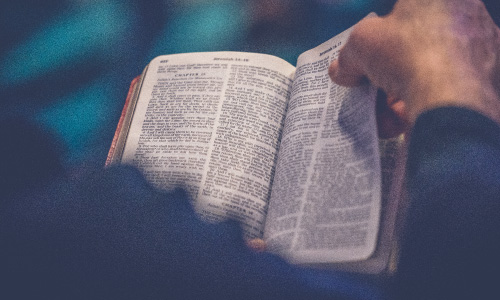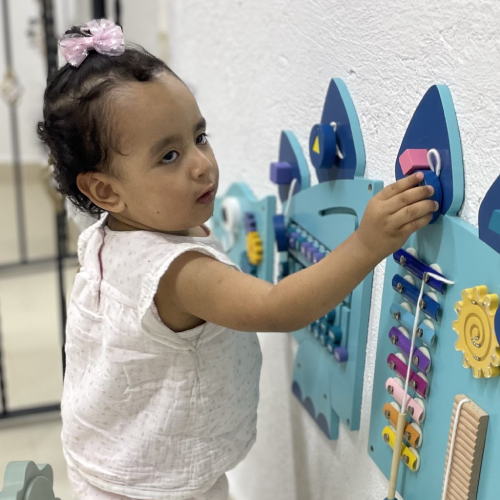Day 18 The Promise of God in Person
Posted on: March 26, 2025
by: Gerrit Dawson, Senior Pastor
by: Gerrit Dawson, Senior Pastor
Every day, pray aloud worshipfully this golden thread that weaves through the entire tapestry of God’s intent for us.
Behold, the days are coming, declares the LORD,
when I will make a new covenant with the
house of Israel. . . .
I will put my law within them,
and I will write it on their hearts.
And I will be their God, and they shall be my people.
They shall all know me, from the least of them
to the greatest. . . .
For I will forgive their iniquity, and I will
remember their sin no more.
(Jeremiah 31:31, 33-34)
Daily Scripture
Isaiah 64:1
Oh that you would rend the heavens and come down. . . .
Isaiah 59:15b-17
The LORD saw it, and it displeased him
that there was no justice.
He saw that there was no man,
and wondered that there was no one to intercede;
then his own arm brought him salvation,
and his righteousness upheld him.
He put on righteousness as a breastplate,
and a helmet of salvation on his head;
he put on garments of vengeance for clothing,
and wrapped himself in zeal as a cloak.
Zechariah 2:10-11
“Sing and rejoice, O daughter of Zion, for behold, I come and I will dwell in your midst, declares the LORD. And many nations shall join themselves to the LORD in that day, and shall be my people. And I will dwell in your midst, and you shall know that the LORD of hosts has sent me to you. And the LORD will inherit Judah as his portion in the holy land, and will again choose Jerusalem.”
Picking Up the Thread

Shortly after the temple dedication, the LORD appeared to Solomon. God reiterated the promise of dwelling with his people in the temple. However, he also issued a warning: “But if you turn aside from following me . . . and . . . go serve other gods and worship them, then I will cut off Israel from the land I have given them . . . and this house will become a heap of ruins” (1 Kings 9:6-8). Indeed, within a few years, Solomon would forsake the LORD for the gods of the many foreign wives he took. Within a century, the kingdom would split in two.
Through the centuries even after periods of renewed faithfulness, idolatry and injustice seduced God’s people. Finally, after decades of warning through the prophets, in 587 BC the LORD allowed the Babylonians to capture Jerusalem, destroy the temple and carry off the people for seventy years. During that exile, they cried out to the LORD to purify their hearts and restore them to Zion. They clung to the promises that accompanied the prophets’ warnings. The LORD had declared that in the end, he would have to come himself to save his people. God’s plan resonated with their deep desire, “Oh that you would rend the heavens and come down” (Isaiah 64:1).
The whole history of Israel becomes a paradigm for the human race. We cannot save ourselves. We cannot clean up our act. We cannot change our hearts. We may strive to create a good life apart from God, but we always fail. We clash with each other in self-pursuits. The stronger dominate the weaker. The crafty cheat the simple. The greedy take all they can. As a human race, we bring destruction and chaos upon ourselves.
Our verses from Isaiah 59 portray God’s coming to the same conclusion: “The LORD saw it, and it displeased him that there was . . . no one to intercede” (Isaiah 59:16). God knew that to save us he would have to take responsibility for those he made. He would have to avert his own wrath against our corruption of his good creation. Without taking away our free will, God would enact a way to change the human heart from the inside out.
In old movies, we might see the hero take off his coat and then roll up his sleeves. He bares his arms for the fight, revealing his prowess and his preparedness. This signals that he is ready to take on the villain. We see this same intention when Isaiah writes, “The LORD has bared his holy arm before the eyes of all the nations” (52:10). God promised to come down here and by his own “arm” dispatch the enemy, both within and without, to make things right. As we see in the Zechariah passage, the LORD promised to dwell in the midst of his people in a greater, more intimate way than ever before since Eden (Zechariah 2:10).
Often Biblical promises are multi-layered. A people in exile would have rejoiced just to get back to Jerusalem, rebuild the temple and return to how the LORD used to meet his people there. Indeed, that happened. But they realized it wasn’t enough. A greater arrival of God in their midst was needed. For centuries more, they watched for the LORD to come as a mighty redeemer. They focused on the passages about a warrior savior who subdues enemies. However, they overlooked the surprise arrival of a suffering servant who could remake not just the nation but the human heart.
Stitching It In
The decisive change that leads to spiritual transformation involves the humility to say, “I can’t. But God, you can.” This fundamental insight from Scripture is embedded in the first of the “Twelve Steps” of Alcoholics Anonymous: “We admitted we were powerless over alcohol—that our lives had become unmanageable.” No one goes there easily. One of my toddler’s first sentences is the heart cry of every human, “I can do it myself!” Oh, how we try to live managing our own lives. How we don’t want to need God! Or, for that matter, anyone else.
Once more, Isaiah cuts straight to the quick: “You were wearied with the length of your way, but you did not say, ‘It is hopeless’” (Isaiah 57:10). Instead, each morning, we regather our self-strength and try once more to solve our lives in our own wisdom and strength. If we are blessed, we come to the realization of how helpless we are before too much irreversible harm has been done. We finally call out, “O that you come down to save me!” (paraphrased from Isaiah 64:1). It is then we discover how the LORD has been waiting to hear this. He knows there is no one to intercede, so he has bared his holy arm in order to save us.
Praying Along the Pattern
I have been missing you with an ancient longing.
Since Eden, we have felt the inconsolable loss.
For so long I did not know how to say it.
There was just a missing piece,
Something more I knew was supposed to be there.
But I did not want to ask you for it.
I feared what I might lose if you came down.
Yet all the time the pit in me deepened.
I kept trying to fill it with more of myself,
And only fell further into nothingness.
In your mercy, you let my misery go on,
Until at last, but not for the last time,
I said, “I can’t. You can. Oh my Father,
Would you come down? Would you
Bare your holy arm, scatter the darkness
And dwell with me once more?”
Posted in:
Lent




 Close
Close












